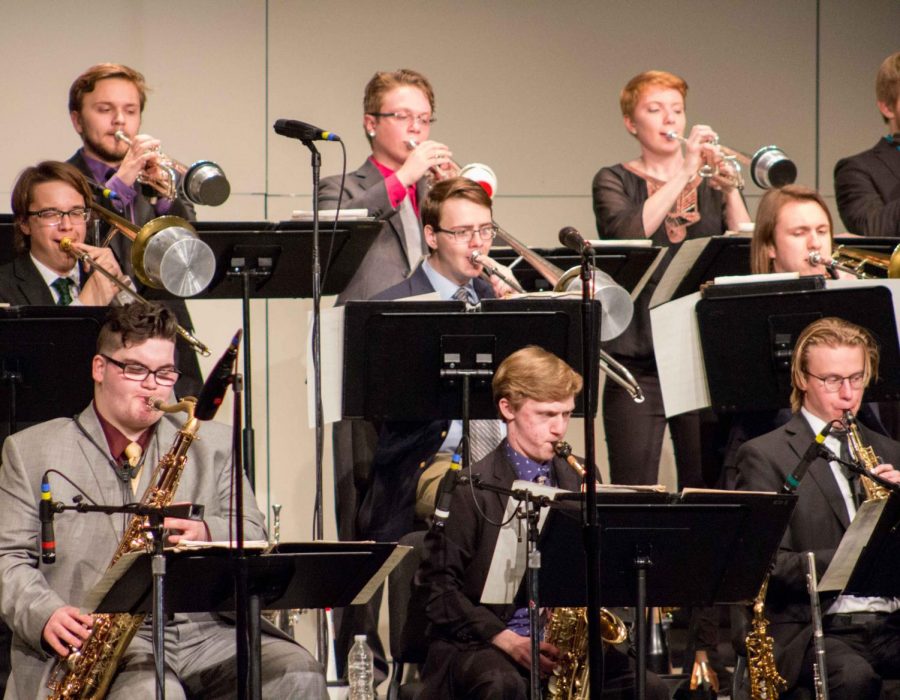UNI to host Tallcorn Jazz Festival
Feb 20, 2020
Between Thursday, Feb. 20 and Friday, Feb. 21, over 60 jazz bands will be
competing for points to earn a spot within the Iowa Jazz Championships during the 65th Tallcorn Jazz Festival, which is put on by the local Phi Mu Alpha Sinfonia
chapter.
The Tallcorn Jazz Festival consists of two parts. There is a competition between the high school bands and there are concerts from UNI Jazz Bands One and Two titled “Sinfonian Dimensions in Jazz.” Each jazz band in the high school area consists of 17-25 players. From there, the competitors are further broken up into school divisions.
“My emphasis on the festival has always been on education,” said UNI Director of Jazz Studies Christopher Merz. “While it is judged and points are awarded, one of the innovations that I brought in, maybe about 12 or 14 years ago, was to ramp up the educational opportunities. Each band, in addition to the performance slot, goes off into a room with a professional jazz musician who has heard their set. That person works with the band for 25 minutes, so they get a full-length clinic as well as the written and recorded comments from the panel of judges.”
For the songs that the high school bands play, it is expected that they do one song in the traditional swing rhythm style. Besides that, the bands are free to choose whatever repertoire they would like. Even with this creative freedom, Merz has noticed a pattern among the performances. After they play a swing tune, the bands will usually play something slow followed by a Latin tune. However, Merz said he enjoys it when their performances are taken in a different direction.
To add variety to each year’s festival, a guest artist is brought in to perform and teach the students more about jazz music performance. This year’s artist is Myra Melford.
“Every year we bring a guest,” said Merz. “Things were different long ago so I can’t really speak to that, I’ve only been here 20 years. The guest artist provides a clinic workshop for the students and an evening concert where that person solos with Jazz Band One. I have tried to get people who are composers, people who will play their own music. Myra teaches at U.C. Berkeley and she has won a Guggenheim Fellowship which is kind of a big deal. I first encountered her music on a recording, she has a band called ‘Be Bread.’ I was so taken by her compositions that I listened to her album ‘The Image of Your Body’ for like, a month.”
For his role in the show, Merz works as a faculty advisor with the fraternity that puts on the show, Phi Mu Alpha Sinfonia. He picks the guest artist for the show and takes input from students. In addition to problem solving, he considers one of his biggest responsibilities to be institutional memory. This means that he provides continuity and historical background from one festival to the next, which allows them to tweak the system.
Senior composition major Isaac Smith is managing the show and Merz expressed gratitude for his contribution to it.
After he’s done working with the fraternity on the show, Merz’s favorite part of the festival is the final concert that’s put on during the second night.
“The concert during the second night is always my favorite part,” Merz said. “It’s so rare in an academic setting for musicians to get a chance to play the exact same concert twice in a row. Jazz music is largely improvised. That means that you’re stepping out on a limb every time you play. It’s always going to be a little bit different. The first night is usually about trying to tick all of the boxes and be correct and accurate. It’s about playing the ensemble music right and playing a nice concert. The second night is ‘Okay, we did the safe one. Now let’s take some risks.’ They don’t always work out, but it’s just so exciting to be a part of that. People bloom when they get another chance at something.”
When UNI students show up to listen to the concert, Merz said that he hopes that they develop an appreciation for the passion that young people still have for jazz music. He wants them to understand that jazz isn’t just the music of the 1930s, 40s or 50s. As he has continued to be a part of the festival for 20 years, the repertoire of music has grown and evolved. Through the Tallcorn Jazz Festival, Merz said he wants everyone to realize that jazz is an evolving and inclusive music that takes from all kinds of influences and sources.








